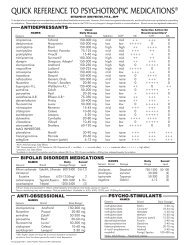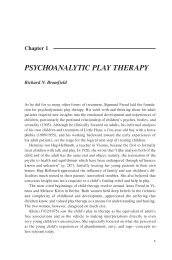IRAQ WAR CLINICIAN GUIDE
Iraq War Clinician's Guide - Network Of Care
Iraq War Clinician's Guide - Network Of Care
Create successful ePaper yourself
Turn your PDF publications into a flip-book with our unique Google optimized e-Paper software.
Iraq War Clinician Guide 84 Impact of Deployment on Family<br />
P Sustainment is the phase that spans from one month post deployment to one month prior<br />
to return. In most adaptive families it is marked by "settling into the new routine" and<br />
going on about regular business, utilizing whatever resources either within or outside of<br />
the family are available. Should a family not be able to return to business-as-usual, this<br />
could impact negatively on the development of children within the family. Some children<br />
may have a difficult time during this period, in the absence of a parent, and may develop<br />
symptoms that should be readily identified and appropriately dealt with. Conflict between<br />
the service member and the remaining spouse can result in emotional turmoil, particularly<br />
because communication may not allow full resolution of all disagreements.<br />
Re-deployment is the phase that spans from one-month prior to return to the actual<br />
physical return of the service member to the family. This is a period of intense anticipation,<br />
with conflicting emotions and possibly some anxiety along with excitement.<br />
Post-deployment is the phase that begins with the return of the service member and ends<br />
with the reestablishment of family equilibrium. Generally, this period may take from one to<br />
several months. The homecoming can be a time of great excitement and jubilation. But, it<br />
also can result in frustration and feeling let down due to unmet unrealistic fantasies about<br />
the reunion. Service members may become frustrated in finding that the family has moved<br />
on in their absence and that changes have been made in family functioning that they were<br />
not involved in. The parent who remained behind during the deployment may experience<br />
a loss of independence with the return of the spouse who begins to re-exercise autonomy.<br />
Marital couples may require time to reestablish physical and emotional intimacy, which<br />
can lead to a sense of disappointment or disillusionment. Ultimately, it is important that<br />
the deployed service member reasserts his or her role within the family and again<br />
reestablishes a healthy equilibrium. Most families and children manage successfully during<br />
deployments, despite inherent challenges.<br />
Children's Responses to Deployment<br />
Children's responses to deployment are individualized and depend upon their developmental<br />
ages. Infants (12 months and younger) are likely to respond to changes in their schedule, physical<br />
environment, or in the presence or availability of caregivers. Disruptions in infant care can lead to<br />
risk of apathy, refusal to eat, or even weight loss. Toddlers (1-3 years) generally take clues from<br />
their primary caregiver. If the non-deploying parent is available and coping well a toddler is likely<br />
to cope well. If not, a toddler may become sullen, tearful, throw temper tantrums, or develop sleep<br />
disturbances. Parents must balance their care for young children with their own needs, using play<br />
dates and support from other parents to assist them.<br />
Preschoolers (3-6 years) have a clearer awareness of the absence of a parent than do younger<br />
children. They may emotionally respond to this with regressive behaviors (regression in potty<br />
training, thumb sucking, sleep disturbance, clinginess, and separation anxiety). They may also<br />
demonstrate signs of irritability, depression, aggression, or somatic complaints. Due to their active<br />
imaginations, preschoolers may develop idiosyncratic or personalized explanations regarding the<br />
deployment of a parent, e.g., "Daddy (or Mommy) left because I was angry at him (her)." These<br />
inaccuracies can best be addressed through brief, matter-of-fact but accurate information related to<br />
the deployment. Preschoolers' concerns related to feelings of responsibility of the deployment<br />
should be dispelled. These young children can best be reassured by parents through attention,<br />
DEPARTMENT OF VETERANS AFFAIRS<br />
NATIONAL CENTER FOR PTSD




